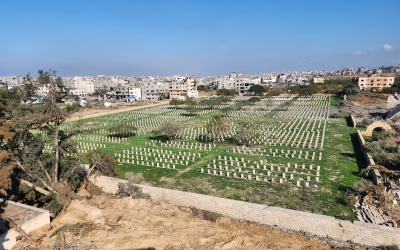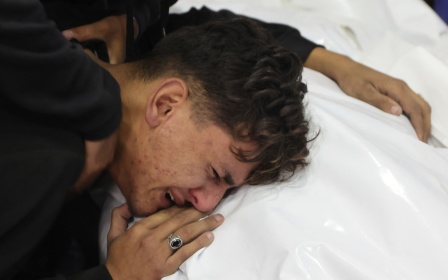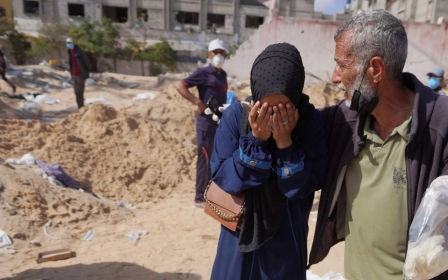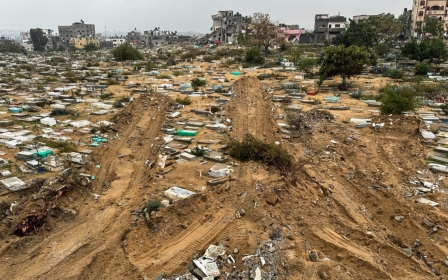War on Gaza: Palestinians haunted by Israeli grave defilements and body theft

After an Israeli air strike killed Alaa al-Sheikh last year, her family buried her in a makeshift graveyard near the Indonesian hospital in northern Gaza.
Access to the main cemetery had become impossible due to intensified ground and aerial attacks in the area.
Israeli troops eventually stormed the vicinity of the Indonesian hospital too, where the temporary cemetery was established.
When the family revisited the site a few weeks later, after the Israeli withdrawal, the body had disappeared.
“We wanted to move her body to the Falouja Cemetery but we were shocked to find neither the grave nor her body,” Yahya al-Sheikh, Alaa’s brother, told Middle East Eye.
New MEE newsletter: Jerusalem Dispatch
Sign up to get the latest insights and analysis on Israel-Palestine, alongside Turkey Unpacked and other MEE newsletters
“The place where her body had been buried was empty, and she was not the only one,” the 45-year-old resident of Jabalia added.
“There were several missing bodies across the cemetery, opened graves, and the whole site was a mess.”
The family searched for days for Alaa’s body, asking residents of the surrounding neighbourhoods what had happened.
Some confirmed that Israeli troops stormed the cemetery, but they could not see what the soldiers did, as anyone who looked out of a window risked being shot.
'To this day, we have no information about my sister’s remains'
- Yahya al-Sheikh, Jabalia resident
“We started crying, it was a tormenting feeling of pain and sadness,” said al-Sheikh.
“We asked many people, but no one knew. Some told us the soldiers might have taken the bodies because there was talk that they seized some. Others suggested the bodies might be buried beneath the ground due to the bulldozing. But we don’t know anything.
“To this day, we have no information about my sister’s remains.”
Since the Israeli ground invasion of Gaza in October last year, mounting evidence has indicated that the Israeli military was systematically desecrating cemeteries, bulldozing graves, bombing burial sites and exhuming bodies from them.
According to the Gaza-based Palestinian Government Media Office, Israeli troops have seized at least 2,300 bodies of deceased Palestinians from Gaza’s cemeteries since 7 October 2023.
The ongoing Israeli attacks have also caused the total or partial destruction of 19 out of 60 cemeteries across the war-battered strip, the office said.
The seizure of bodies has become a new and haunting fear for many in Gaza, who have yet to process the loss of their loved ones in the relentless Israeli bombardment.
Buried but not at rest
Anhar Ramadan, whose sister was killed in an Israeli air strike last November, says her sister’s body was not lost but was found in a “horrible scene".
“My house was bombed on 5 November 2023. I remained under the rubble for four hours. When I got out, my body was burnt, my left hand was dislocated, and the rest of my body was burned,” the 41-year-old resident of Nuseirat in the central Gaza Strip told MEE.
“They did not immediately tell me who was killed in the bombing. A week later, after they had buried them, I found out that my sister Rabab, my daughter, my sister’s husband, and her son had been martyred.”
A few weeks later, after beginning to recover, Ramadan insisted on visiting the graves of her daughter and sister in the al-Qassam Cemetery in Nuseirat.
“I went to the cemetery, and everything was fine. And I visited them whenever I missed them. I have been doing this for months,” she said.
However, an Israeli incursion into the area around two months ago changed the scene.
“I decided to visit them [after the incursion] and found a horrible scene. My sister’s grave had been desecrated, it was open near her head, and her head was showing,” she explained.
“It felt like a fire had ignited within me and I cried heavily for days. I don’t know who dug up her grave. Her body was exposed at her head, and it was a horrifying sight. I called my brothers, and they immediately came to fix the grave."
Buried but not at rest
A CNN investigation found that as of January the Israeli military desecrated at least 16 cemeteries in its ground offensive in Gaza, including by opening graves and removing bodies, as part of “a search for the remains of hostages seized by Hamas”.
On 25 September, Israel sent a truck carrying the decomposed bodies of nearly 90 Palestinians to Gaza, without disclosing any details about their identities or whether some of them had been seized from graves.
'My dream has shifted from seeing my dad again to simply finding his body still in his grave'
- Habiba Salama, displaced Palestinian
“When my father was killed, people tried to comfort me by saying I no longer had to worry about him starving, getting injured, or being detained,” Habiba Salama, a 35-year-old displaced woman now living in Deir al-Balah in central Gaza, told MEE.
Her father had refused to be displaced and chose to stay in northern Gaza.
“But it’s not true that I feel less worried now,” she added.
“Being away from the place where he was buried, and constantly hearing and reading about Israeli occupation forces opening graves and removing bodies, I am terrified they might seize his body.”
Salama says the first thing she would do upon returning to northern Gaza is visit her father’s grave. But she doubts she will find it.
“I am scared I will never be able to revisit him. He is buried in a cemetery that no one can currently reach,” she said.
“Can you imagine? My dream has shifted from seeing my dad again to simply finding his body still in his grave.”
Middle East Eye delivers independent and unrivalled coverage and analysis of the Middle East, North Africa and beyond. To learn more about republishing this content and the associated fees, please fill out this form. More about MEE can be found here.





